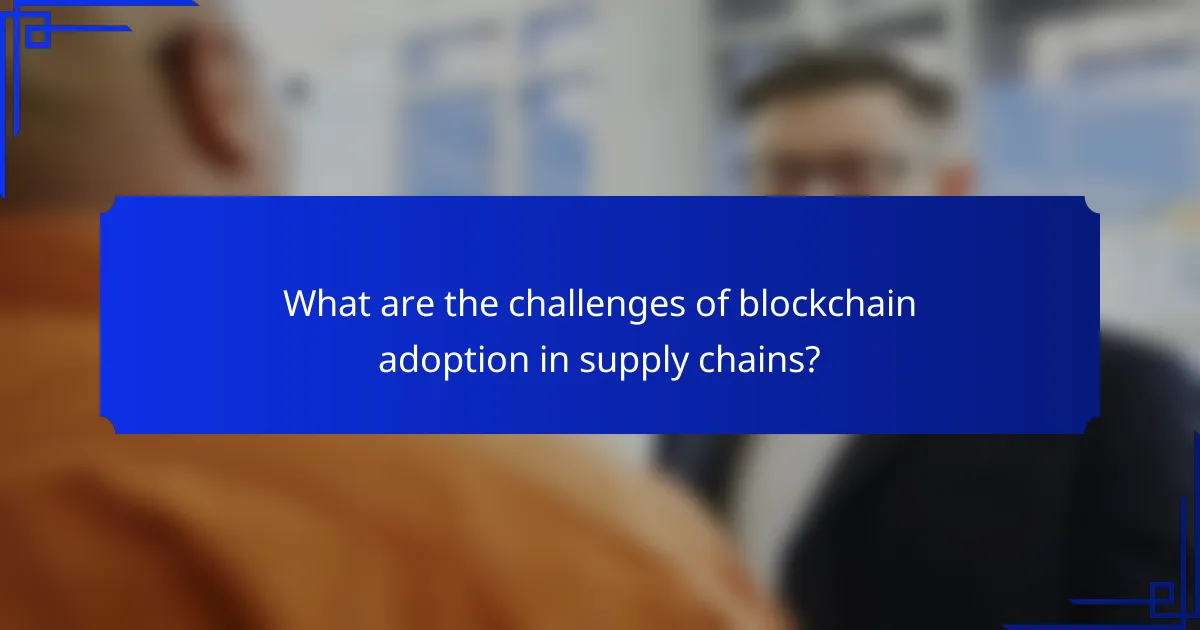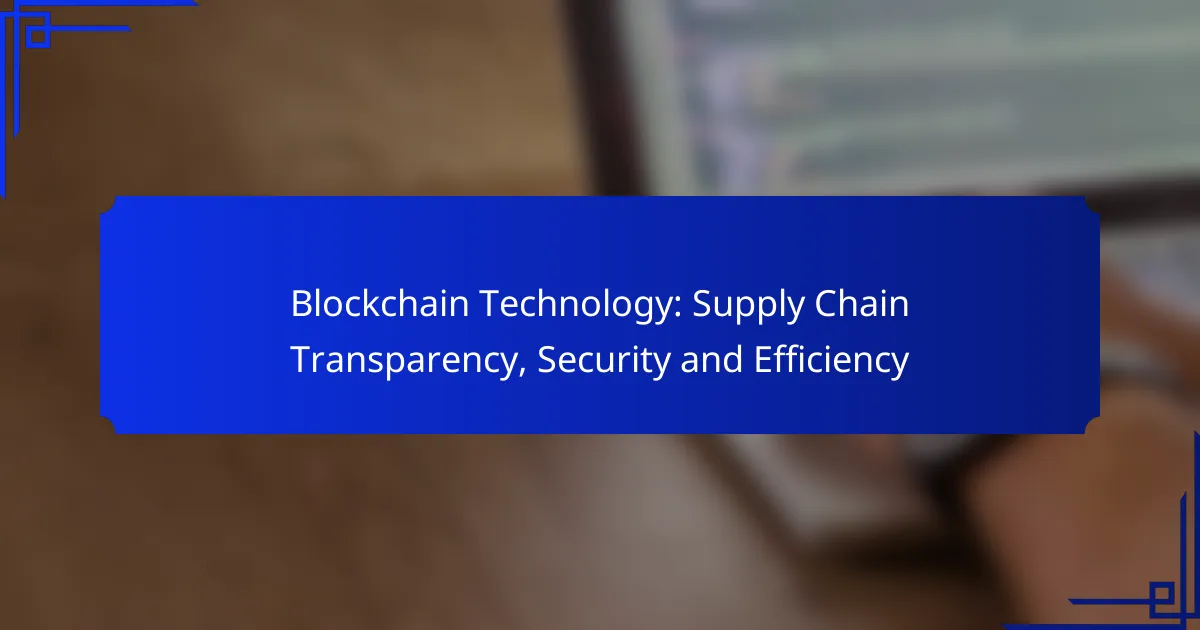Blockchain technology revolutionizes supply chain management by enhancing transparency, security, and efficiency. By utilizing a secure and immutable ledger, it allows for real-time tracking of goods, ensuring accountability and traceability among all stakeholders. This decentralized approach not only mitigates the risk of fraud but also streamlines operations, reducing delays and improving decision-making across the supply chain.

How does blockchain enhance supply chain transparency?
Blockchain enhances supply chain transparency by providing a secure, immutable ledger that records every transaction and movement of goods. This technology allows all parties involved to access real-time data, ensuring accountability and traceability throughout the supply chain.
Immutable record-keeping
Blockchain’s immutable record-keeping means that once data is entered, it cannot be altered or deleted. Each transaction is cryptographically secured and linked to previous entries, creating a permanent chain of information that can be audited at any time. This feature significantly reduces the risk of fraud and errors, as all stakeholders can trust the integrity of the data.
For example, if a product is recalled due to safety concerns, blockchain allows companies to trace the exact origin and journey of that product quickly. This capability can save lives and protect brand reputations by ensuring swift action.
Real-time tracking
Real-time tracking through blockchain technology enables stakeholders to monitor the status and location of goods at any moment. This transparency helps in optimizing inventory management and reducing delays in the supply chain. Companies can respond promptly to changes in demand or disruptions, leading to improved efficiency.
For instance, a retailer can track shipments from suppliers to warehouses in real-time, allowing for better planning and reduced stockouts. This capability is especially beneficial in industries like food and pharmaceuticals, where timely delivery is critical.
Decentralized data access
Decentralized data access in blockchain means that all authorized participants in the supply chain can view and verify the same data without relying on a central authority. This democratization of information fosters collaboration and trust among partners, as everyone has equal access to the same records.
By using a decentralized system, companies can eliminate bottlenecks associated with traditional data sharing methods, such as emails or centralized databases. This approach not only speeds up processes but also enhances security, as there is no single point of failure that could be exploited by malicious actors.

What are the security benefits of blockchain in supply chains?
Blockchain technology enhances security in supply chains by providing a decentralized and immutable ledger that ensures data integrity and transparency. This reduces the risk of fraud and increases trust among stakeholders.
Data integrity through cryptography
Blockchain employs cryptographic techniques to secure data, ensuring that once information is recorded, it cannot be altered without consensus from the network. Each transaction is linked to the previous one, creating a chain that is resistant to tampering.
This cryptographic security means that any changes to the data would require altering all subsequent blocks, which is practically impossible in a well-distributed network. As a result, stakeholders can trust the authenticity of the information shared across the supply chain.
Fraud prevention mechanisms
Blockchain’s transparency and traceability features serve as effective fraud prevention mechanisms. Each participant in the supply chain has access to the same information, making it easier to identify discrepancies or unauthorized changes.
For example, if a product’s origin or journey is misrepresented, the blockchain can quickly reveal the true history, allowing companies to take corrective actions. This shared visibility discourages fraudulent activities and enhances accountability among all parties involved.

How can blockchain improve efficiency in supply chains?
Blockchain enhances efficiency in supply chains by providing a decentralized and transparent ledger that streamlines operations, reduces delays, and automates processes. This technology enables real-time tracking of goods, ensuring that all stakeholders have access to accurate information, which minimizes errors and enhances decision-making.
Streamlined processes
Blockchain simplifies supply chain processes by creating a single source of truth accessible to all participants. This eliminates the need for multiple records and reconciliations, allowing for smoother collaboration among suppliers, manufacturers, and distributors. For example, a retailer can instantly verify the authenticity of a product by checking its blockchain record, reducing the time spent on audits and compliance checks.
Reduced transaction times
With blockchain, transactions can occur in real-time, significantly cutting down the time required for processing orders and payments. Traditional supply chains often involve intermediaries that slow down transactions; blockchain removes these middlemen, enabling direct peer-to-peer interactions. As a result, transaction times can drop from days to mere minutes, enhancing overall responsiveness.
Cost savings through automation
Automation is a key benefit of blockchain technology, leading to substantial cost savings in supply chains. Smart contracts, which execute automatically when predefined conditions are met, can reduce manual labor and administrative overhead. Companies can save tens of percent on operational costs by minimizing errors and streamlining workflows, allowing resources to be reallocated to more strategic areas.

What are the prerequisites for implementing blockchain in supply chains?
Implementing blockchain in supply chains requires careful consideration of stakeholder collaboration and the underlying technology infrastructure. These elements ensure that all parties are aligned and that the necessary technical framework supports blockchain’s capabilities.
Stakeholder collaboration
Effective stakeholder collaboration is crucial for successful blockchain implementation in supply chains. All parties, including suppliers, manufacturers, distributors, and retailers, must agree on the shared goals and standards for data sharing and transparency.
Establishing a governance model that defines roles, responsibilities, and decision-making processes can help facilitate collaboration. Regular meetings and workshops can also promote trust and communication among stakeholders, ensuring everyone is on the same page.
Technology infrastructure
A robust technology infrastructure is essential for deploying blockchain in supply chains. This includes selecting the right blockchain platform that meets the specific needs of the supply chain, such as scalability, security, and interoperability with existing systems.
Companies should assess their current IT capabilities and consider necessary upgrades or integrations. Additionally, investing in training for employees on blockchain technology can enhance adoption and maximize the benefits of the new system.

Which industries are adopting blockchain for supply chain solutions?
Various industries are increasingly adopting blockchain technology to enhance supply chain transparency, security, and efficiency. Key sectors include food and beverage, pharmaceuticals, and retail, where the need for traceability and trust is paramount.
Food and beverage industry
The food and beverage industry is leveraging blockchain to ensure product traceability from farm to table. This technology allows consumers to verify the origin of their food, which is crucial for safety and quality assurance.
For example, companies can track the journey of ingredients, reducing the risk of contamination and enabling quicker recalls if necessary. Implementing blockchain can also streamline processes, potentially lowering costs associated with supply chain inefficiencies.
Pharmaceutical sector
In the pharmaceutical sector, blockchain is being used to combat counterfeit drugs and ensure compliance with regulations. By providing a secure ledger of transactions, it helps verify the authenticity of medications at every stage of the supply chain.
Pharmaceutical companies can track products from manufacturing to distribution, enhancing safety and regulatory compliance. This transparency is vital for maintaining trust with consumers and healthcare providers.
Retail and e-commerce
Retail and e-commerce businesses are adopting blockchain to improve inventory management and customer experience. With real-time tracking of products, retailers can optimize stock levels and reduce waste.
Additionally, blockchain enables secure transactions and enhances customer trust by providing transparent information about product origins. Retailers can also use this technology to streamline returns and manage supply chain disruptions more effectively.

What are the challenges of blockchain adoption in supply chains?
Blockchain adoption in supply chains faces several challenges, including scalability, integration with existing systems, and regulatory compliance. These obstacles can hinder the effective implementation of blockchain solutions, impacting transparency, security, and efficiency.
Scalability issues
Scalability is a significant challenge for blockchain in supply chains, as many current blockchain systems struggle to handle large volumes of transactions efficiently. As supply chains grow and demand increases, the ability to process transactions quickly becomes critical.
For instance, public blockchains may experience slow transaction speeds and high fees during peak times, making them less viable for high-frequency supply chain operations. Solutions like layer-2 scaling or private blockchains can help, but they often come with trade-offs in terms of decentralization and security.
To address scalability, companies should evaluate their specific transaction needs and consider hybrid models that combine the strengths of both public and private blockchains. Regular performance assessments and adjustments can also help maintain optimal efficiency as the supply chain evolves.
